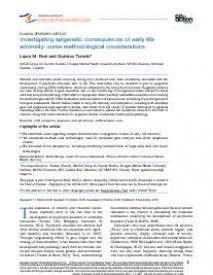Investigating epigenetic consequences of early-life adversity : some methodological considerations
Stressful and traumatic events occurring during early childhood have been consistently associated with the development of psychiatric disorders later in life. This relationship may be mediated in part by epigenetic mechanisms, such as DNA methylation, which are influenced by the early-life environment. Epigenetic patterns can have lifelong effects on gene expression and on the functioning of biological processes relevant to stress reactivity and psychopathology. Optimization of epigenetic research activity necessitates a discussion surrounding the methodologies used for DNA methylation analysis, selection of tissue sources, and timing of psychological and biological assessments.
Recent studies related to early-life adversity and methylation, including both candidate gene and epigenome-wide association studies, have drawn from the variety of available techniques to generate interesting data in the field. Further discussion is warranted to address the limitations inherent to this field of research, along with future directions for epigenetic studies of adversity-related psychopathology.
In: European journal of psychotraumatology, ISSN 2000-8066 | 7 | [1] | 31593
http://dx.doi.org/10.3402/ejpt.v7.31593


